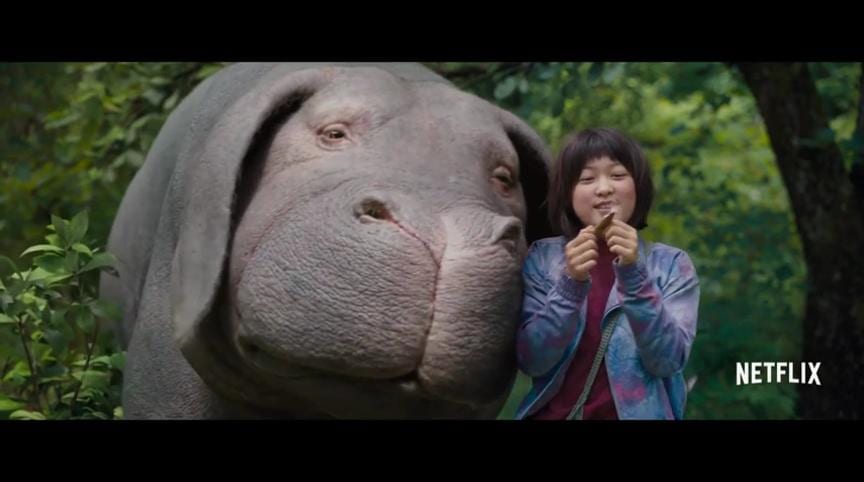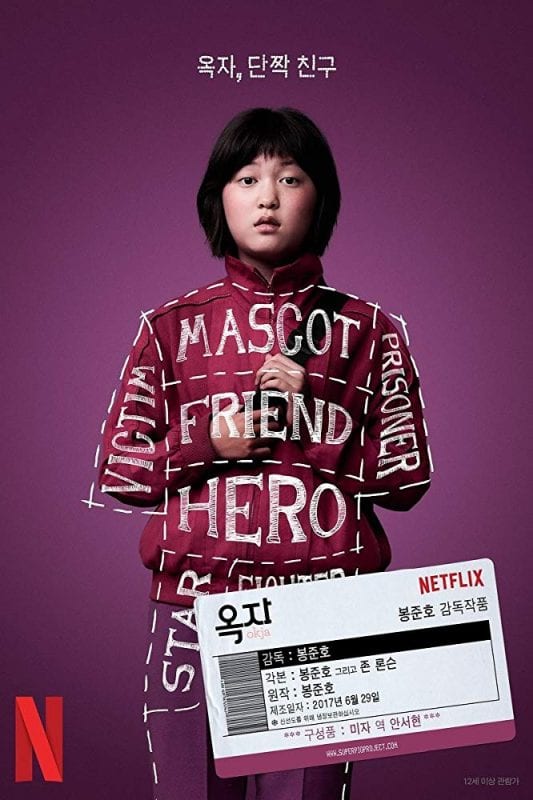The 2017 film Okja, directed by Bong Joon-ho, has a way of making you think about a lot of things. Things a lot of us consider a normal part of our daily routines. I wake up, I eat some eggs and sausage, I read a lot of books, I maybe go to the movies, I play with my dog, go to work, come home, try not to slam my head on my coffee table as I watch the evening news, take some sleeping medication so I can stop lying in bed wondering about when I’ll die and if I ever did anything worthwhile when I was alive.
Okja made me question this daily routine of mine because if a little girl from the South Korean countryside can be so stubborn and hell-bent on saving her huge super pig friend from the literal mouths of a greedy corporation, then why is it so much harder for us, as adults, to care about things?
The film starts by introducing us to the Mirando Corporation. The new CEO Lucy Mirando played by Tilda Swinton, immediately mentions the well-known atrocious past of her psychotic grandfather’s company, explaining things are going to be different. The press sits and watches a presentation about 26 super pigs, how the pigs are all natural and are going to be raised in 26 different countries by different renowned farmers. The super pigs are supposed to be eco-friendly and most importantly, taste good.
The film jumps time and continents to get to the South Korean countryside where Mija (Ahn Seo-hyun) and Okja spend their days happily and haphazardly roaming the hills, fishing, and exploring, to go home at night to her grandfather (Byun Hee-bong) so they can chow down on some fish stew. Yum. By this time in the film we’ve already seen that Mija and Okja share a very loving relationship, they tell each other secrets, and nap together. Most importantly though, they save one another when the other gets into a sticky situation.
It’s easy to get nostalgic all the way through this film. Not for any particular decade that only us ’90s kids will remember, just a time in your life when you were happy, without responsibility, when you didn’t have to keep making sure that your payday fell near enough the due date of the electric bill, so you don’t have to weep by candlelight, but rather weep in the sweet glow of LED bulbs or the glowing screen of your TV as you binge-watch Netflix. Remembering these times when you were happy also leads me to another thought, when I was younger I was also stubborn, and had endless amounts of energy to burn, for sometimes seemingly useless causes. In the case of Okja though, the cause of saving her adorably large life is definitely not a useless cause.
By the time the Mirando Corporation shows up to Mija’s mountaintop to come to see Okja, we all already know something funky is going on, even though grandpa just promised us that our big pig friend was perfectly safe. Lying isn’t cool, grandpa. Here though, on this mountaintop, we meet Johnny Wilcox (Jake Gyllenhaal) who is portraying an animal lover and crazy person extraordinaire. People have a lot of different opinions on Gyllenhaal’s character in this film. The character is obviously supposed to be over the top and leaning towards pathetic on the personality meter. Some people like blunt and to the point arcs in a film, while others feel it pulls them out of an otherwise immersive experience. Me, personally, I love the character. Wilcox is out of place everywhere he goes, with his Mark Twain pitched voice and the fact that he knows he’s a hack, an impostor, and only a face for people to look at drives him into a dark place, and I can dig it.
By the time we’re done drinking in all of Wilcox’s crazy, grandpa has taken Mija off into the woods to visit the graves of her parents, where we find out that they have been dead for quite some time, and that’s why she’s living with grandpa in the first place. Grandpa gives up his secrets and tries to talk Mija into forgetting about her lifelong best friend and go into town and hook herself a husband, bribing her with a solid golden miniature pig statue. This scene alone speaks to the resiliency and stubborn nature of youth. Mija stands next to her parent’s graves and completely rejects an easy future. She has to go find and save her pig friend and at this point, let’s be honest, Okja is way more hippopotamus than she is a pig. “Super Pig” does have a more user-friendly ring to it than “Super Hippo” does, which is probably why the name was chosen in the first place.

Mija takes some cash and bolts for Seoul to find Okja, where she beelines for Mirando’s offices. One of the most memorable scenes in the movie is Mija throwing herself against a wall of tempered glass inside the Mirando office because no-one will pay attention to her. There are some pretty obvious points made in this scene. The point that wasn’t lost on me was one that I had to Google just to be able to write about it. The glass is tempered vs. plated. I knew there was a difference, I’ve seen a million movies, and at least 3,543 of those movies have someone being thrown through or out of a window. Tempered glass takes a whole lot more energy to break than plate glass does. While when tempered glass breaks, it is a lot less likely to hurt you than plate glass is, that struck a chord with me. If you use enough energy to take the time to break tempered glass, you probably have a good reason to break it, so in the end, it isn’t going to hurt as bad. On the other hand, it’s by comparison very easy to break plate glass, but you could easily end up in ribbons after breaking it. So carrying out a plan, using the easy way, could end up with dire consequences while taking the time to lay out a plan and carry it out properly is always going to be harder, it probably won’t kill you in the end.
Finally, Mija spots Okja being prodded into a truck and being prepped to make her trip to New York, where she’ll be presented as the greatest super pig of all other super pigs. What an honor. Mija books it across the city on foot chasing the truck, only to find that there is another group of people who want to rescue her friend, but they’re not terrorists, so calm down. The group in this film, Animal Liberation Front or ALF, is a real animal rights group. The group is easy to find and access and actually do have a credo stating that they want to do everything in their power to save animals while doing as little harm as possible to any living creature. The meet-cute of the group and Mija in the film is during a chaotic rescue and chase scene through a shopping mall. ALF’s leader in the film, Jay (Paul Dano), lets Mija know that they’re on her side, and will do whatever they need to do to get her and her super hippo back home safely. His character is likable, and honest, and does a good job of making me forget that Dano played a character a long time ago that I didn’t bat an eyelash at when they were murdered by Daniel Day-Lewis.
Seeing as how Mija doesn’t at the time speak any English, and the group is comprised of adults that do, K (Steven Yeun) acts as an in-group translator for Mija and the adults of ALF. Some would argue that K may not be the worlds best translator. Jay explains as calmly and honestly as possible that the group’s intentions are to let the baddies capture Okja and take her to New York to be put on display for the world. That Okja will indeed go under a slew of experiments, probably not harmful ones though, as she needs to look pretty for her close-up. The group is going to turn Okja into a hidden camera and will record all the terrible things that Mirando does to animals, in the name of feeding the starving masses. Mirando has been trying to shake a terrible reputation of animal abuse and world pollution for over a decade now. ALF has no intention of letting the world go on blissfully ignorant of the true horrors of the Mirando corporation though, and they need Okja to complete this task.
Mija understands the plan but doesn’t agree with it. She just wants to go home, with her friend, back to a world that isn’t cruel and filled with people who don’t care. K doesn’t tell the group this, he instead tells them that Mija is alright with the plan. This is important. Mija is consistently being lied to by adults, for what they think is her own good. Everyone has a memory of being lied to by adults as children, for their own good. The lies you and I remember usually resemble your childhood dog Baxter being taken to a huge open farm, instead of being hit by a car or dropped off at a shelter. We believed them and didn’t realize the truth until it was far too late. We all grow up, and we all come to the same heartbreaking realization. People lie. People lie for almost any reason, for gain, profit, for access, to spare feelings, to manipulate. No matter the reason though, people will lie if it helps them in their situation.

Okja is captured and does make her way to Mirando’s underground laboratory. She’s put through experiments and forced to mate.
Since Okja and Mija’s romp through the supermarket has been caught on camera and spread all over the world, Mirando knows that their image is teetering on the brink of destruction once again. So, they decide to fly Mija out to New York so she can be a cute young face for their cause. ALF is just finding out about K’s discrepancies in translation, and Jay does a full 180 in character and beats the tarnation out of K for his lies. While you can understand Jay’s anger, you still begrudgingly understand why K did what he did. Nonetheless, ALF makes their way to New York, as does Mija. All for the same reason. It’s time to show the world what Mirando is really all about, and get Okja and Mija back home to safety.
The plan does not go off without a hitch. The world does get to see what really happens behind closed doors at Mirando, but the group fails initially to rescue Okja when they’re overrun by the NYPD. The last half hour of this movie is where, if you’re anything at all like me, will just have you continuously crying. Between your anger for all the lies told so far by characters in the movie, and failed attempts at rescues, there just aren’t enough tissues in the world. ALF and Mija make their way to the real destination of the film. To an animal holocaust camp. All the super pigs are all herded into pins here, and then up the stairways to heaven, where they’re clamped into huge machines to keep them still, while they’re shot point blank range in the head, and then their carcasses continue on into the production line to be broken down and cut into edible bits and pieces. Mija and ALF break into this compound and make their way to Okja, to be met by Nancy Mirando, Lucy’s twin sister, and replacement since she failed to keep up appearances for her company’s family.
Nancy is a shrewd businesswoman, who does listen to reason or rather listens to money. Mija once again throws away what could have been an easy life and throws the golden pig statue at Nancy in exchange for Okja. Finally, and I mean finally, you get to breathe a quick sigh of relief since you know Mija and Okja are going to both get out alive and make it back home. Before that, though, you get to deal with leaving the compound and seeing the thousands of other super pigs and their babies left behind. The wail they let out as they are passed by is heartbreaking. One of the super pigs shoves their baby out at Okja who hides it in her mouth and takes it with her as she marches towards freedom. The end of the movie shows Mija and Okja and the baby pig back in the countryside, happy, and healthy, definitely worse for wear. Then after the credits roll you see Jay leaving prison to meet up with K only to find both of them back on a bus with the rest of ALF about to upset another one of Mirando’s plans. It just leaves it all out on the table for you to see that, just because one battle was won, it doesn’t mean that there aren’t a million more battles to be fought and that there are some people left willing to fight the battles.
While we all become a little more apathetic as we grow older, we don’t completely lose all hope. We don’t walk away from every battle, and this film does a good job of showing the viewer how difficult it can be to get the right thing done. This film reminds us that people who are fighting for what is right or just, often times don’t have a lot of power, and they’re fighting against people who have a whole lot of power lying around. In no way does that mean we all give up, it just means we band together and all of our little power combined together can give us enough energy to break the tempered glass.

